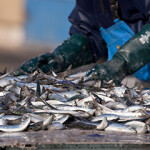Irish fishers get EUR 25 million from EU in aid package to alleviate Brexit impacts

The Irish seafood industry has welcomed a EUR 25 million (USD 26.5 million) aid package recently granted by the European Union that aims to alleviate some of the negative effects of Brexit, such as reduced quotas and a downsized national fleet, which have led to skyrocketing local seafood prices and depressed consumption, Irish fishers claim.
Though most Irish seafood industry players think the package will provide some relief, they also believe the problems are too big and long-lasting for one aid package to fully fix.
Data from Ireland’s Central Statistics Office showcase that Irish seafood prices rose 15.6 percent in August compared to the same month in 2021, when the effects of Brexit started to hit home for the Irish fleet. The increase ran well ahead of the 6.3 percent overall inflation over the period and was above the rates for other sources of protein. Frozen fish prices rose highest at 28 percent over the two years, while poultry prices rose 24 percent in the same timeframe.
Some national media narratives have laid the blame for high seafood prices on the fleet’s dependence on fossil fuels. A report by national broadcaster RTE described fishing as far more dependent on fossil fuels than other industries. Aodh O’Donnell, the head of the Irish Fish Producers Organization (IFPO), dismissed that claim.
“A 2023 report by BIM [Bord Iascaigh Mhara, or the Irish Seafood Board] shows carbon emissions for the seafood sector are under 400,000 MT of carbon dioxide. That's less than 2 percent of the emissions produced in other key food sectors, including agriculture. This report on fish prices presents a narrow and unbalanced view,” O’Donnell said.
Instead, the IFPO has squarely blamed its troubles on …




Share